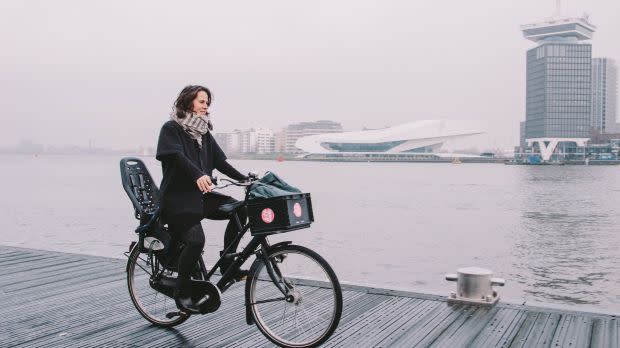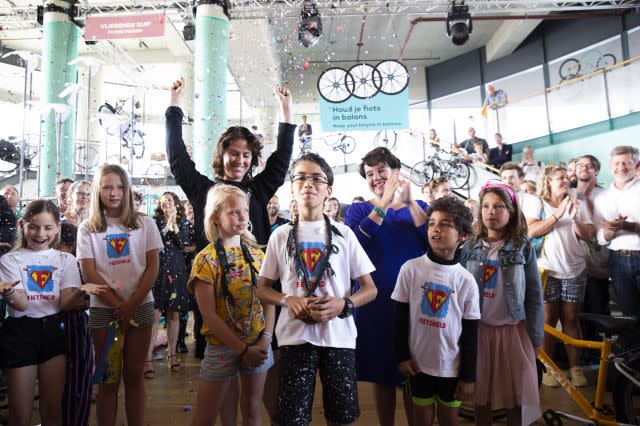“Bicycles could save the world”: Meet Amsterdam’s bicycle mayor

Bicycles are the common thread that links “all the dots” in Katelijne Boerma’s life.
The 45-year-old sports teacher and program manager at the University of Amsterdam chose to study, live, and raise her family in the Dutch capital because she wanted to be able to bike every day. In 2017, Boerma saw an ad in a newspaper inviting people to run for the unusual position of “bicycle mayor.” The position is part of the Bicycle Mayor & Leaders Network, run by bike advocacy organization BYCS. The goal of the network is to elect individuals committed to making every city more bicycle-friendly by working with civil society groups and municipal governments.
Boerma remembers thinking when she read the ad that it was perfect fit for her. “I am the mom, I am the professional, I…have that very busy life and the way I connect all these tasks or challenges on a daily basis is because of the bicycle,” she explains. She decided to run for Amsterdam’s bicycle mayor, which meant writing a letter of motivation and giving a presentation to a technical advisory committee made up of the city’s real mayor and members of the transit authorities. In November 2017, Boerma became Amsterdam’s second bicycle mayor, having run on a platform of turning everyone, especially parents and toddlers, into cyclists.
Amsterdam is known as the bicycle capital of the world because of its cyclist-friendly culture and infrastructure, including more than 500 kilometers of cycle paths and lanes. Nearly half the working population of the city commutes daily by bike. But it wasn’t always this way. In the 1950s and 60s, the city was “in thrall to motorists,” according to The Guardian, and it was only after traffic casualties rose that activists managed to insist on a change in transit policies. The oil crisis of the 70s also made fuel more expensive and led to a push for energy conservation.
Now, says Boerma, bicycle mayors have spread to 91 cities—a global movement powered by the idea that “if Amsterdam can do it, any city in the world can do it.”
More than a bicycle
For Boerma and other bicycle mayors, cycling is about more than mobility. It’s about improving public health, reducing air pollution, fostering human connection, and raising independent children. That’s why she argues that “bicycles could save the world.”
Cycling every day has health benefits for adults and children alike. A large-scale prospective population-based study published in 2017 in the British Medical Journal found that adults who cycle to work every day have a lower long-term risk of dying of cancer or cardiovascular disease. Other studies have shown that children who cycle or walk to school, as opposed to being driven in a car, are able to concentrate better in class. They’re also more active, which helps prevent childhood obesity and asthma, supports healthy bone growth, and reduces stress.
More daily cyclists also means fewer cars on the road. According to the World Health Organization (WHO), only 20% of the world’s urban population lives in areas with good air quality, and more than 90% of the world’s children breathe polluted air that can be toxic to their health and development. Studies show that getting enough people off the roads and onto bicycles can reduce emissions (pdf) of noxious particles in the air. But the overall air quality depends on several factors, including the volume of traffic and meteorological conditions.
Finally, encouraging children to cycle teaches them to be independent. This aligns well with the Dutch philosophy of parenting, which generally encourages children to be self-sufficient. As Boerma, who first started teaching her three children to ride a bike at age three, explains, “You need to be able to trust your kids. Go; you know your way.”
The Bicycle Mayor and Leaders Program
Although bicycle mayors are part of the same Bicycle Mayor & Leaders Network and share a common code of conduct and mission, each one of them is different because every city is different. Some bicycle mayors encourage under-represented populations, such as women or immigrants, to cycle. Others work with municipal governments to make cycling less dangerous. In Amsterdam, Boerma’s main goal has been to make every child a competent cyclist by age 12.

Ten-year-old Armin Taheri is chosen to become the new junior bicycle mayor of Amsterdam.
She has had help in the form of 10-year-old Armin Taheri, Amsterdam’s junior bicycle mayor, and his predecessor, 9-year-old Lotta Crok.
The biggest obstacle for many bicycle mayors is funding. They raise money on a project-to-project basis from municipalities and private donors, but Boerma says that few funders want to pay for important overhead costs, such as hiring legal experts in cities with strict transit laws. Bicycle mayors are volunteers, and balancing a daytime job with eight to 10 hours of weekly bicycle mayor duties is also a challenge. “There’s only 24 hours per day and you need to sleep,” Boerma says, calling for “more bicycle mayors to extend the network in The Netherlands.”
The program “allows the chance for people who are tirelessly working to improve cycling in their area to not only be recognized for their hard work but also have the support of a network of mayors around the world,” wrote Chris and Melissa Bruntlett, founders of the Modacity cycling advocacy blog, in an email to Quartz. “However, the drawback can be that as a volunteer, largely symbolic position, it can be difficult to have influence on the greater civic discourse to effect real change at the local government level.”
These days, Boerma travels around the world to promote the Bicycle Mayor & Leaders Network. Through her travels, she has learned that every city in the world is similar in at least one important aspect: the needs and aspirations of its inhabitants. “Wherever you go, whether you go to Quito or Tripoli or Amsterdam…there are the same people living there with the same necessities and the same dreams in life,” she says. “It’s really quite simple: I need to be able to buy my bread, I need to play with my kids, I need to go to work.” Bicycles can help.
Sign up for the Quartz Daily Brief, our free daily newsletter with the world’s most important and interesting news.
More stories from Quartz:
